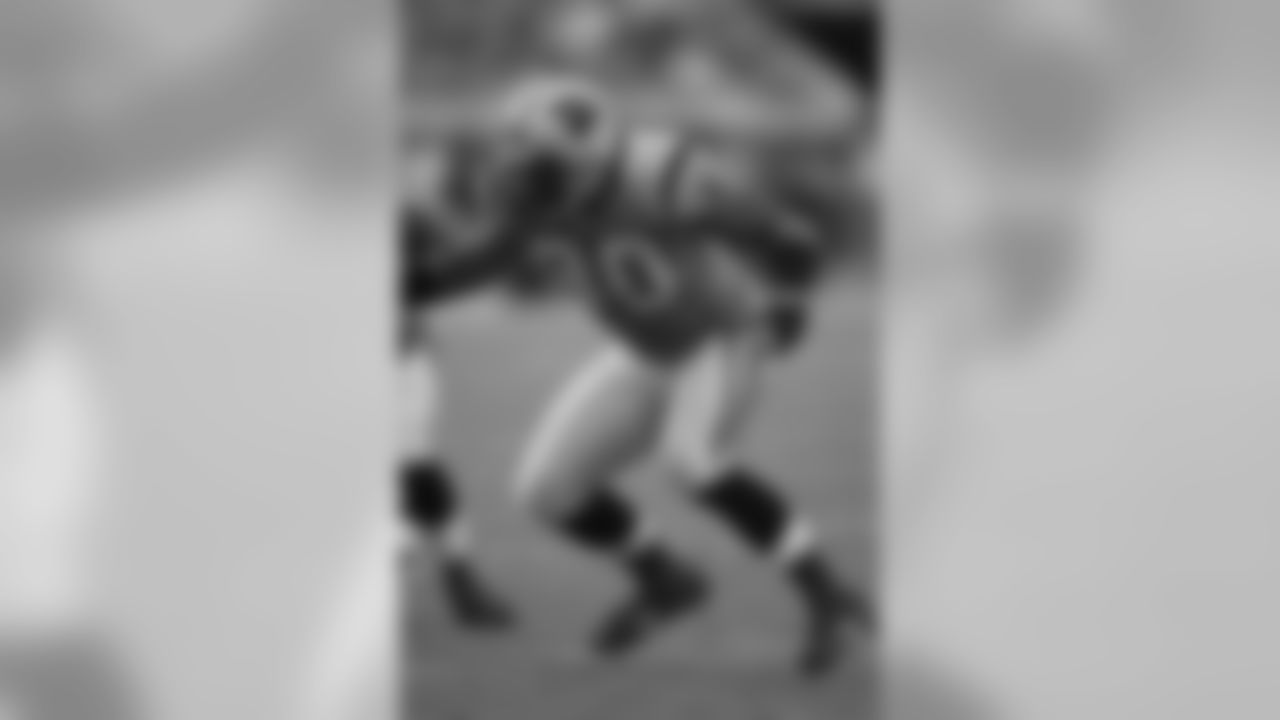CHARLOTTE — It's December, it's cold, and you've got three wins. It's been a long season already.
It's easy to wonder why.
But if you're trying to build something, you latch onto any motivation you can, whether it's job security or the promise of a better day. Any spark will do.
It's easier in hindsight when you can look back and point to that December leading to a Super Bowl the following year. But when you're in it, it's hard.
The 2002 Panthers, with a first-year coach and an odd lot of a roster, had lost eight in a row before a Dec. 1 trip to Cleveland, of all places. But on that snowy weekend, something turned, and when they look back, they realize that game was the start of a journey they couldn't imagine.
"You have to keep going; you have to keep looking to the future because otherwise, there's no hope," former Panthers coach John Fox said. "So you have to build hope, especially when you're mathematically eliminated. Otherwise, these guys risk their careers every time they go out there. They've still got football to play left, and you better explain why. That's true in the military; that's true in everything. The old days of, you know, run into a brick wall just because somebody told him to, those are gone.
"You've got to explain the why. This is a band of brothers, and you're doing it for the guy next to you, and the why is someday you're going to reap the benefits."
The parallels to what the Panthers are doing now are obvious. They're 3-10 under their first-year head coach with an odd lot of a roster, but they're also playing competitive football on a regular basis again.
Their why in December is also hope for things to come, and they can only hope it works out as well as it did in 2002.
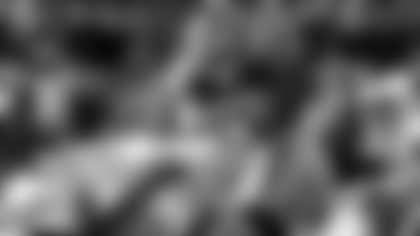
The Panthers couldn't see the Super Bowl from where they were standing at that moment in Cleveland. They didn't have a great roster at the beginning of the season, and then guys started falling by the wayside.
Their quarterback was 36-year-old Rodney Peete. The running back was a sixth-rounder named Dee Brown, who, at the time, was still getting confused with the NBA slam dunk champion from a decade earlier. Tight end Wesley Walls was on his last legs. Middle linebacker Dan Morgan was headed to injured reserve with a bad shoulder.
And yet.
By clutching and grabbing and uglying up a game, the Panthers somehow won a 13-6 game against the Browns. Brown ran for 122 yards, but it took him 27 carries to do it. Peete threw for a grand total of 89 yards and a touchdown to Walls. Somehow, it was enough.
And then it started turning into something. The following week, they blew out the Bengals. Then, there was a loss to the Steelers before they came home to beat the Bears. Suddenly, they had won three of four, with an otherwise meaningless trip to 9-6 New Orleans to close the season. (It was meaningful for the Saints, who were fighting for a Wild Card spot.)
"That was our playoff game," Fox said. "And I remember we kind of treated it like our playoff game to build some momentum into the next season. We were going to be a spoiler, and that was about it because we were eliminated."

What unfolded was a classic John Fox shootout, a 10-6 win on the road.
"Turtle ball," Fox said with a laugh. "You do what you've got to do to win a game, no doubt."
But putting the clamps on the Saints that day, getting by on a Peete touchdown pass to Brad Hoover and not much else, proved a larger point to Fox and that team.
After a 3-8 start, they closed by winning four of five to finish 7-9. The meaning grew throughout the following offseason when they upgraded a number of key spots on the roster and made that work matter. Free agency brought quarterback Jake Delhomme, running back Stephen Davis, and wide receiver Ricky Proehl. The draft yielded tackle Jordan Gross. Two of those names remain on the wall as members of the team's Hall of Honor, in large part for the Super Bowl run the following year.
Asked how often he referred back to that December during the following offseason, Fox just laughed.
"All the time," he said. "You've got to walk before you run."

For some of them, the backstory had even more layers.
A young receiver named Steve Smith was beginning to make a name for himself in 2002, growing beyond the return role he was drafted for in 2001. He began that rookie year by taking the opening kickoff in Minnesota back for a touchdown. But the Panthers didn't win another game that season.
So those first tastes of consistently good football were like a drug, and they all knew they wanted more.
"It also has to do with the year before where some of us were 1-15," Smith said. "And then it also has to do with guys understanding that they are playing for their livelihood. Guys are playing for employment, knowing that next year, this team is going to look a lot different. I think people started to realize; it started to get very evident that there would be some people who weren't going to be back.
"So you just saw a lot of guys starting to do the math and really realize, hey, I could be part of this regime moving forward, or I could be part of another regime next year."
Smith wasn't thinking about a Super Bowl run at that time, because he was trying to stay employed for other reasons. That was the year he punched a couple of teammates, one in training camp and another in November. So his personal transformation was mirroring the team's, and remembering how fast it all turned brings a laugh.
"They were calling for my head to be released," Smith said. "I was dealing with my own stuff at the time. There were just a lot of moving parts that no one foresees."

Morgan remembered watching it from the sidelines, a shoulder injury the week before that Cleveland game sidelining him the rest of the season. He was part of a defense full of emerging stars and veterans, from Julius Peppers and Kris Jenkins and Will Witherspoon to Brentson Buckner and Mike Rucker and Mike Minter, and they knew they were onto something. Fox wasn't going to play "Turtle Ball" without them.
"I think we knew in the locker room that we had talent like we knew that we had a team that was ready to compete," Morgan said. "A lot of it has to do with the belief in the locker room, too, but I think every year is different.
"But we could definitely tell that we were building towards something."
And then he paused, and grinned, the obvious parallel hitting the general manager of the current team too.
"Kind of like how we are right now."
View photos from Carolina's memorable 2003 season as the Panthers won the NFC Championship and advanced to Super Bowl XXXVIII.

Carolina Panthers' Steve Smith (89) reacts after his game-winning five-yard touchdown catch as Tampa Bay Buccaneers players Corey Ivy (35) and Shelton Quarles (53) stand by during the final minutes of the fourth quarter of the Panthers' 27-24 win in Charlotte, N.C., Sunday, Nov. 9, 2003. (AP Photo/Rick Havner)

Carolina Panthers receiver Muhsin Muhammad celebrates a fourth quarter touchdown against the New England Patriots in Super Bowl XXXVIII in Houston, Sunday, Feb. 1, 2004. (AP Photo/Mark J. Terrill)

Carolina Panthers' Ricky Proehl celebrates his 5-yard touchdown catch in the second quarter against the Atlanta Falcons Sunday, Sept. 28, 2003, in Charlotte. (AP Photo/Chuck Burton)

Carolina Panthers linebacker Dan Morgan (55) prepares to blitz during a 32-29 loss to the New England Patriots in Super Bowl XXXVIII on February 1, 2004 at Reliant Stadium in Houston, Texas. (AP Photo/Kevin Terrell)

Carolina Panthers wide receiver Muhsin Muhammad (87) catches an 85-yard pass reception during a 32-29 loss to the New England Patriots in Super Bowl XXXVIII on February 1, 2004 at Reliant Stadium in Houston, Texas. (AP Photo/Kevin Terrell)
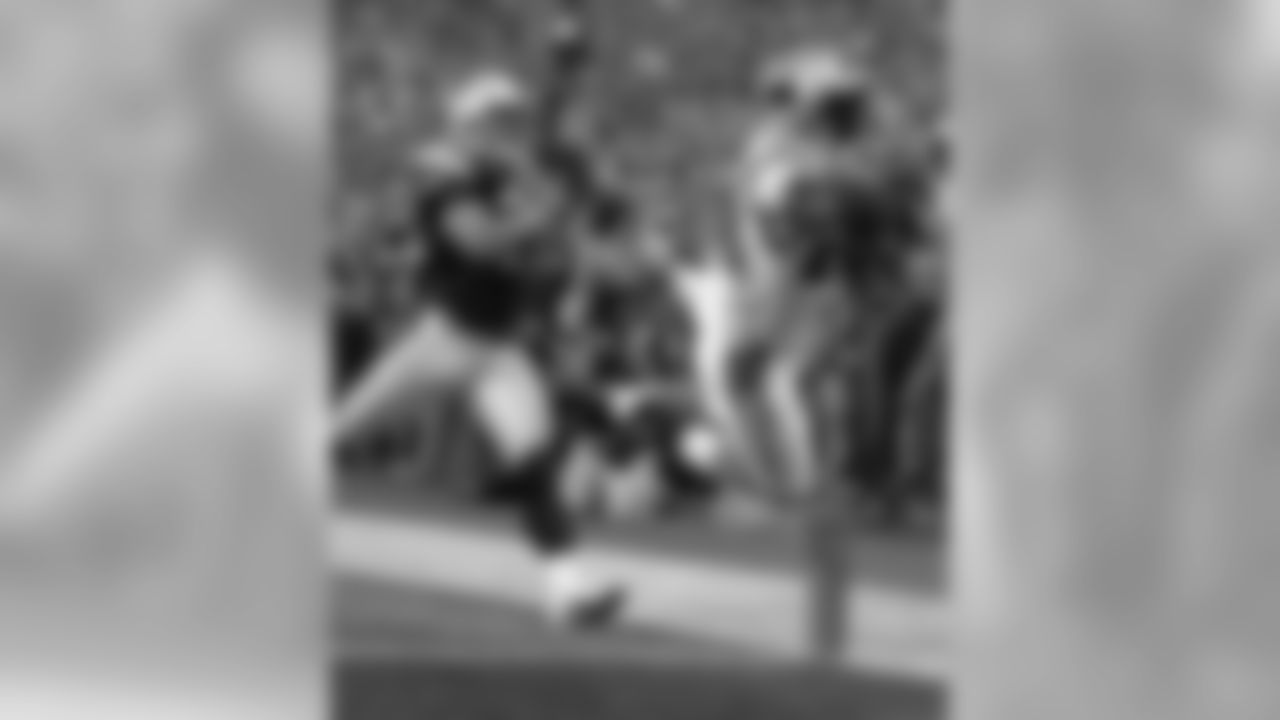
Carolina Panthers running back DeShaun Foster dives into the end zone for a touchdown past New England Patriots safety Rodney Harrison in the fourth quarter of Super Bowl XXXVIII in Houston, Sunday, Feb. 1, 2004. (AP Photo/Mark J. Terrill)

Carolina Panthers wide receiver Steve Smith (89) races upfield with a reception during an NFL game against the Arizona Cardinals in Tempe, Ariz., Dec. 14, 2003. The Panthers defeated the Cardinals 20-17 at Sun Devil Stadium. (AP Photo/NFL Photos/Kevin Terrell)

New England Patriots Tyrone Poole, left, and Richard Seymour, right, attempt to stop Carolina Panthers running back Stephen Davis (48) during the third quarter of Super Bowl XXXVIII in Houston, Sunday Feb. 1, 2004. (AP Photo/Morry Gash)

Carolina Panthers head coach John Fox hugs running back Stephen Davis after defeating the Philadelphia Eagles 14-3 in the NFC Championship game in Philadelphia Sunday, Jan. 18, 2004. (AP Photo/Bill Kostroun)
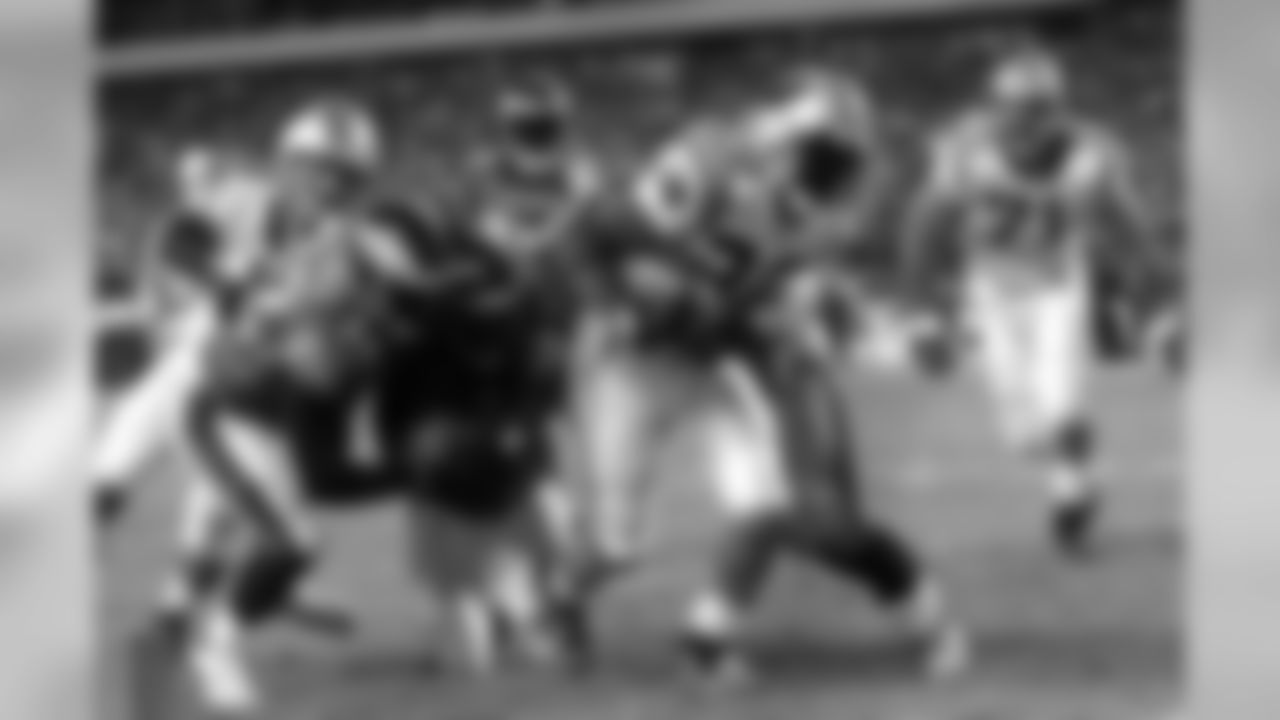
Carolina Panthers running back DeShaun Foster (20) scores a touchdown against the defense of Philadelphia Eagles strong safety Michael Lewis (32) and linebacker Nate Wayne (54) during the third quarter of the NFC Championship game in Philadelphia Sunday, Jan. 18, 2004. (AP Photo/Dave Martin)

Carolina Panthers cornerback Ricky Manning (24) runs back an interception as Philadelphia Eagles Hank Fraley (63) pursues during the third quarter of the NFC Championship game in Philadelphia Sunday, Jan. 18, 2004. (AP Photo/Chuck Burton)

Carolina Panthers quarterback Jake Delhomme (17) warms up while running back Stephen Davis (48) looks on during the Patriots' practice in Reliant Stadium in Houston Saturday, Jan. 31, 2004. The Panthers meet the New England Patriots for Super Bowl XXXVIII, Sunday, Feb. 1. (AP Photo/Michael Conroy)
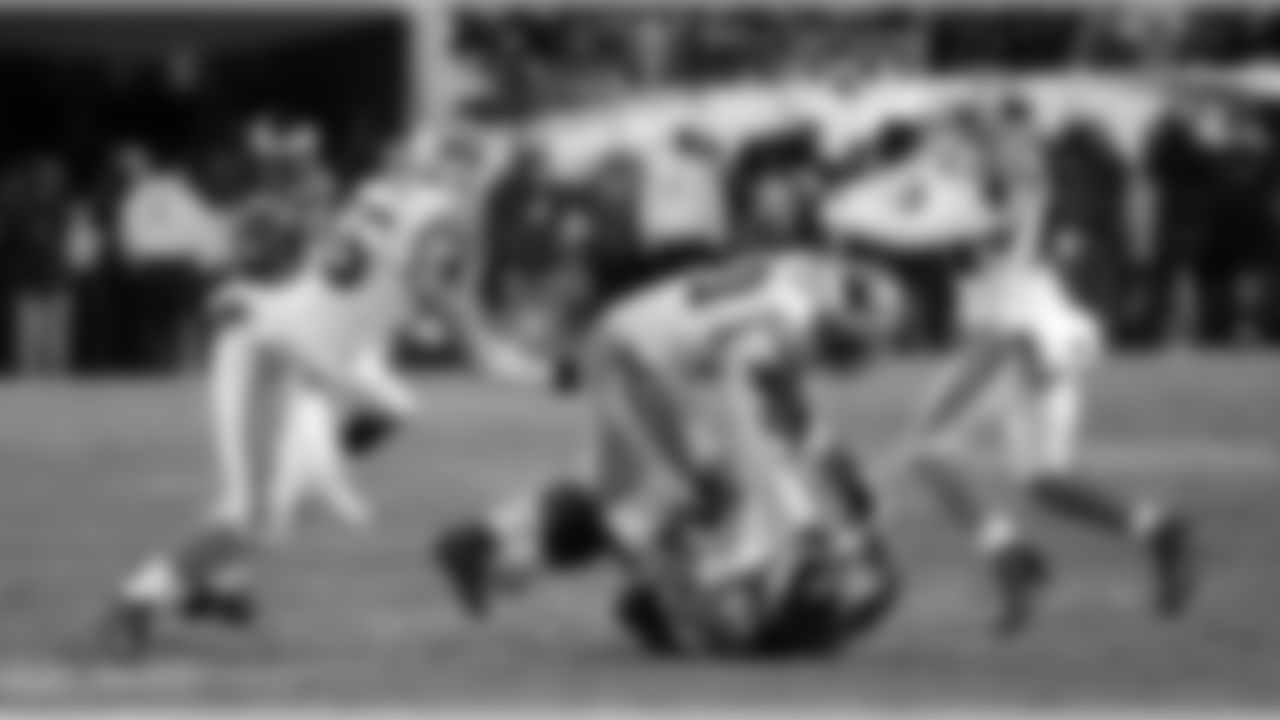
Carolina Panthers cornerback Ricky Manning, right, intercepts a pass intended for Philadelphia Eagles wide recieverJames Thrash (80) during the third quarter of the NFC Championship game in Philadelphia Sunday, Jan. 18, 2004. The Panthers Mike MInter (30 and linebacker Dan Morgan (55) are in on the play. (AP Photo/Bill Kostroun)

Carolina Panthers' Ricky Manning Jr. taunts the crowd after they defeated the Philadelphia Eagles 14-3 during the NFC championship game Sunday, Jan. 18, 2004, in Philadelphia. Manning picked off three passes by Donovan McNabb and helped put the Carolina Panthers in their first Super Bowl. (AP Photo/Chuck Burton)

Carolina Panthers quarterback Jake Delhomme (17) throws a pass on the run during an NFC Divisional Playoff Game against the St. Louis Rams. The Panthers defeated the Rams 29-23 in overtime on January 10, 2004 in St. Louis, Missouri. (AP Photo/Kevin Terrell)
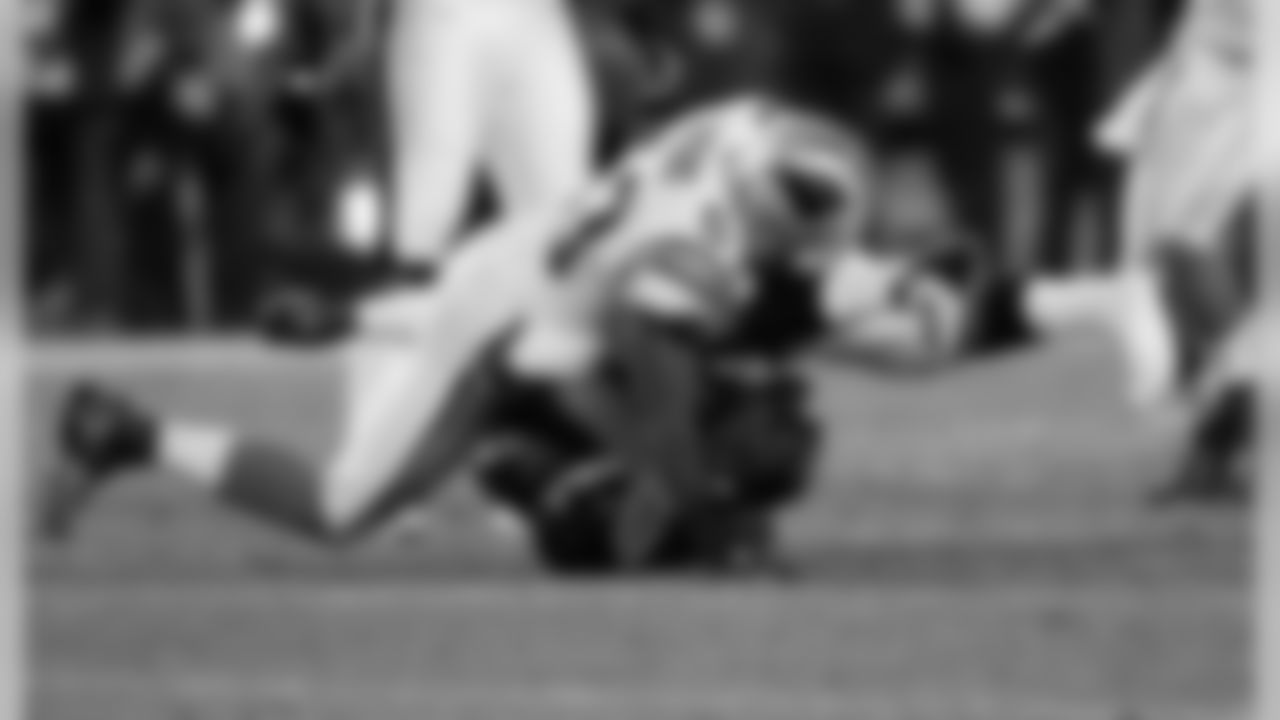
Philadelphia Eagles quarterback Donovan McNabb is hit by Carolina Panthers linebacker Greg Favors in the second quarter of the NFC Championship game in Philadelphia Sunday, Jan. 18, 2004. (AP Photo/Chuck Burton)

Carolina Panthers fans crowd the square at Trade and Tryon Streets in Uptown during a pep rally for the team in Charlotte, N.C. Friday, Jan. 16, 2004. The Panthers will play the Philadelphia Eagles in the NFC Championship game Sunday in Philadelphia. (AP Photo/Erik Perel)

Carolina Panthers wide receiver wide receiver Steve Smith (89) catches a pass during an NFC Divisional Playoff Game against the St. Louis Rams. The Panthers defeated the Rams 29-23 in double overtime on January 10, 2004 in St. Louis, Missouri. (AP Photo/Kevin Terrell)

Carolina Panthers defensive ends Julius Peppers, left, and Micheal Rucker watch a field goal attempt during the first overtime period against the St. Louis Rams in the NFC divisional playoff game Saturday, Jan. 10, 2004, in St. Louis. (AP Photo/Charles Rex Arbogast)

Carolina Panthers running back Stephen Davis carries the ball against the St. Louis Rams during the NFC divisional playoff game Saturday, Jan. 10, 2004, in St. Louis. (AP Photo/Charles Rex Arbogast)

Carolina Panthers running back Stephen Davis (48) heads upfield against the New England Patriots during Super Bowl XXXVIII on February 1, 2004 at Reliant Stadium in Houston, Texas. The Patriots defeated the Panthers 32-29. (AP Photo/Kevin Terrell)

New York Giants quarterback Jesse Palmer is grabbed by Carolina Panthers' Julius Peppers during the second quarter at Giants Stadium in East Rutherford, N.J., Sunday, Dec. 28, 2003. (AP Photo/Ed Betz)

Carolina Panthers running back DeShaun Foster (20) heads upfield against the New England Patriots during Super Bowl XXXVIII on February 1, 2004 at Reliant Stadium in Houston, Texas. The Patriots defeated the Panthers 32-29. (AP Photo/Kevin Terrell)
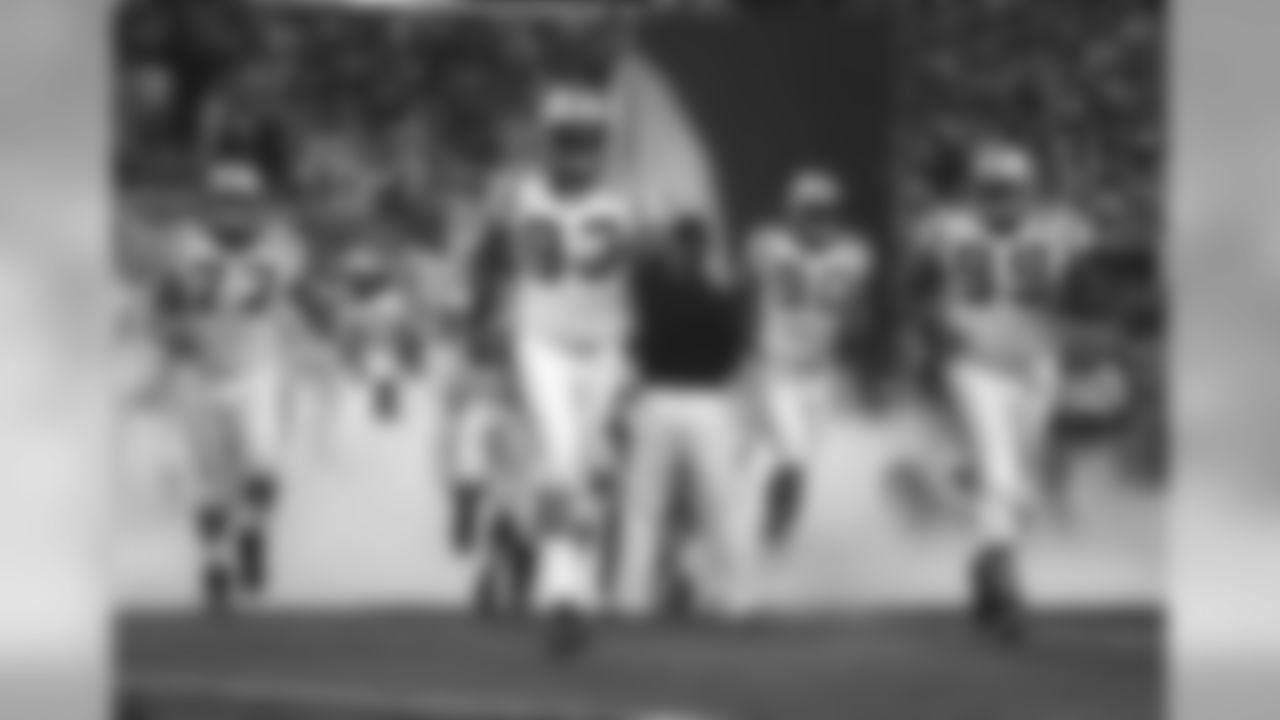
Carolina Panthers players take the field before taking on the New England Patriots in Super Bowl XXXVIII on February 1, 2004 at Reliant Stadium in Houston, Texas. The Patriots defeated the Panthers a 32-29. (AP Photo/Kevin Terrell)
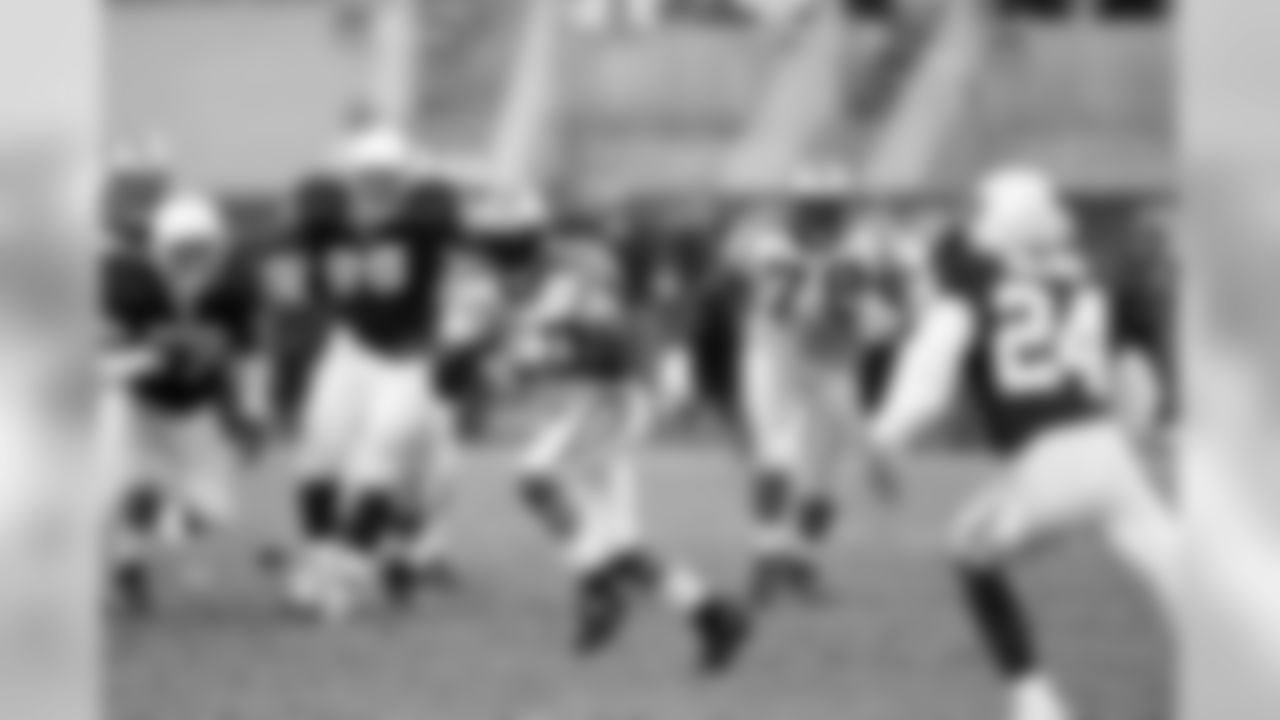
Carolina Panthers running back DeShaun Foster (20) heads upfield during an NFL game against the Arizona Cardinals. The Panthers defeated the Cardinals 20-17 at Sun Devil Stadium in Tempe, Arizona on December 14, 2003. (AP Photo/Kevin Terrell)

Carolina Panthers' Muhsin Muhammad tapes Super Bowl XXXVIII media day festivities at Reliant Stadium in Houston, Tuesday Jan. 27, 2004. (AP Photo/Eric Gay)
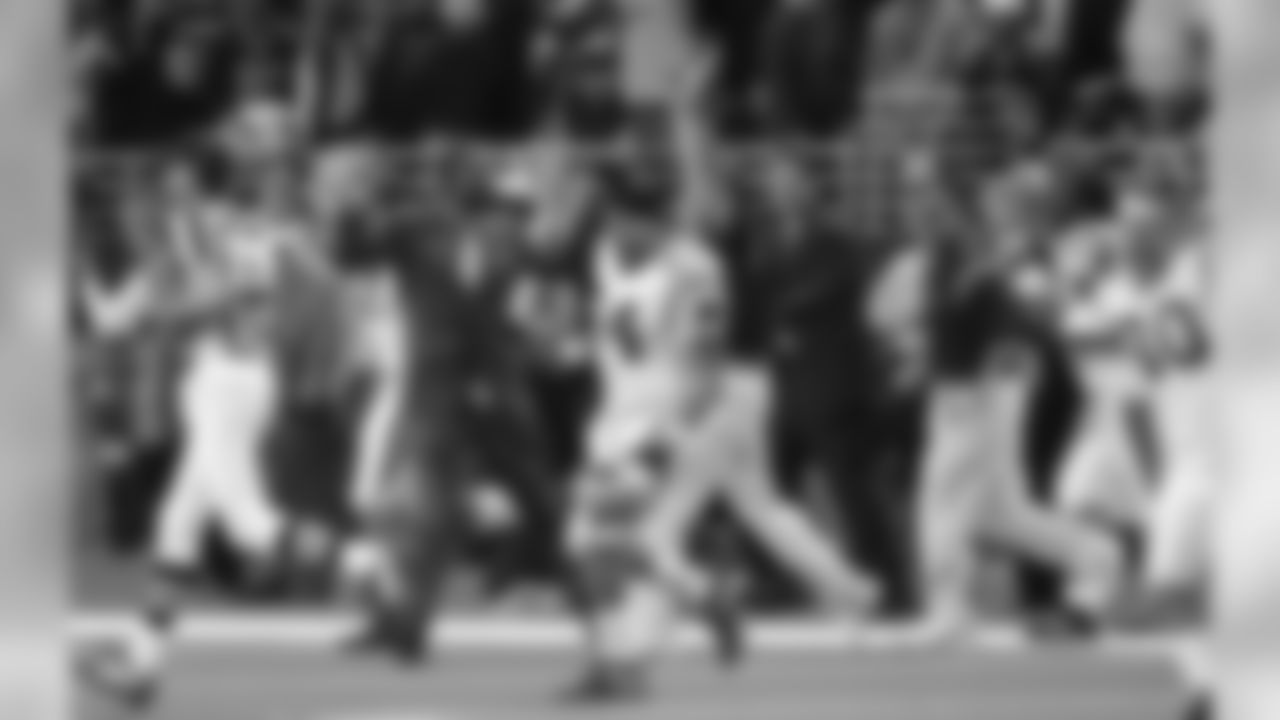
Members of the Carolina Panthers bench celebrate following their 29-23 double overtime win against the St. Louis Rams during their NFC playoff game in St. Louis Saturday, Jan. 10, 2004. (AP Photo/James A. Finley)

Carolina Panthers Steve Smith, top, catches a pass over New England Patriots Tyrone Poole, rear, that set up a touchdown run by DeShaun Foster in the fourth quarter of Super Bowl XXXVIII in Houston, Sunday Feb. 1, 2004. Patriots teammate Eugene Wilson, left front, looks on. AP Photo/Morry Gash)
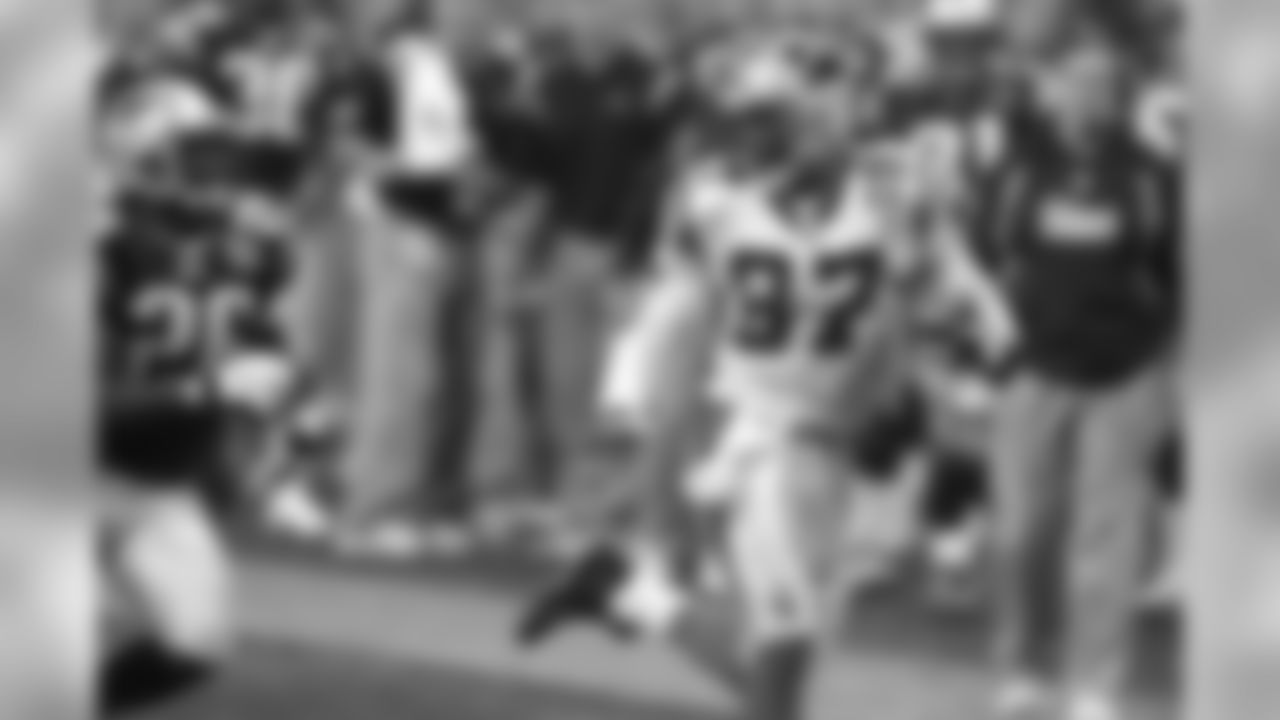
Carolina Panthers Muhsin Muhammad (87) looks back at New England Patriots' Eugene Wilson (26) after pulling down a pass from quarterback Jake Delhomme to score an 85-yard touchdown in the fourth quarter of Super Bowl XXXVIII in Houston, Sunday Feb. 1, 2004. Patriots coach Bill Belichick, rear right, looks on during the play. (AP Photo/Morry Gash)

Carolina Panthers' Julius Peppers (90) and DeShaun Foster celebrate victory after they defeated the Philadelphia Eagles 14-3 during the NFC championship game Sunday, Jan. 18, 2004, in Philadelphia. (AP Photo/Chuck Burton)
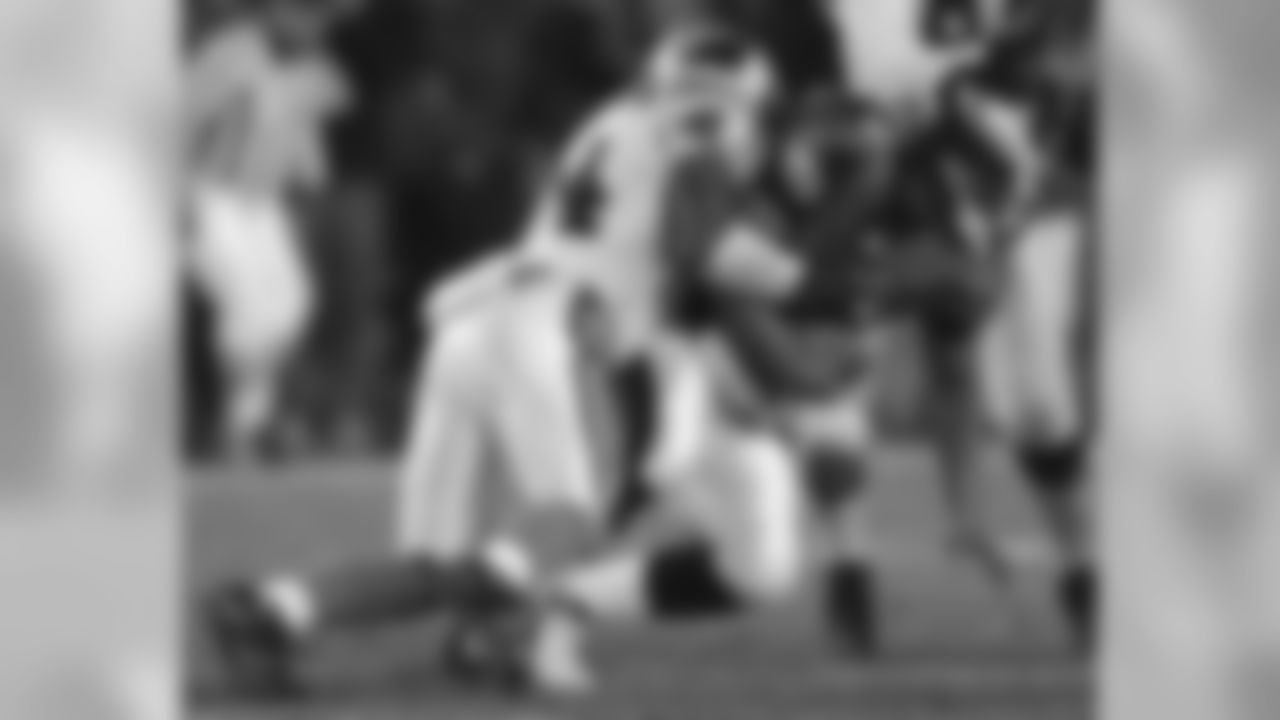
Carolina Panthers' Will Witherspoon (54) sacks Philadelphia Eagles' quarterback Donovan McNabb in the first quarter during the NFC championship game Sunday, Jan. 18, 2004, in Philadelphia. (AP Photo/Bill Kostroun)

Carolina Panthers' Julius Peppers answers questions during media day, Tuesday, Jan. 27, 2004 at Reliant Stadium in Houston. Super Bowl XXXVIII will be played Sunday, Feb. 1, 2004 between the New England Patriots and the Carolina Panthers. (AP Photo/Michael Conroy)

Carolina Panthers wide receiver Steve Smith (89) makes a touchdown catch with Houston Texans defender Jamie Sharper (55) in pursuit, during the first quarter, Sunday, Nov. 2, 2003, in Houston. (AP Photo/David J. Phillip)

Carolina Panthers quarterback Jake Delhomme talks to his mom after defeating the Philadelphia Eagles 14-3 in the NFC Championship game in Philadelphia, in this Jan. 18, 2004 photo. (AP Photo/Dave Martin)

Carolina Panthers quarterback Jake Delhomme celebrates after defeating the Philadelphia Eagles 14-3 in the NFC Championship game in Philadelphia Sunday, Jan. 18, 2004. (AP Photo/Dave Martin)

Carolina Panthers fullback Brad Hoover (45) scores on a 7-yard run during during an NFC Divisional Playoff Game against the St. Louis Rams. The Panthers defeated the Rams 29-23 in overtime on January 10, 2004 in St. Louis, Missouri. (AP Photo/Kevin Terrell)

Carolina Panthers safety Mike Minter signals against the Philadelphia Eagles during the NFC championship game Sunday, Jan. 18, 2004, in Philadelphia. (AP Photo/George Widman)

Dallas Cowboys' Richie Anderson (20) is up-ended by Carolina Panthers' Will Witherspoon (54) in the fourth quarter of the Panthers' 29-10 win at Ericsson Stadium in Charlotte, N.C., Saturday, Jan. 3, 2004. (AP Photo/Tony Gutierrez)

Carolina Panthers quarterback Jake Delhomme (17) drops back to pass against the St. Louis Rams during a 2003 NFC Divisional Playoff Game. The Panthers defeated the Rams 29-23 in overtime on January 10, 2004. (AP Photo/Kevin Terrell)

Carolina Panthers coach John Fox reacts during the fourth quarter against the New York Giants Sunday, Dec. 28, 2003, at Giants Stadium in East Rutherford, N.J. The Panthers beat the Giants, 37-24. (AP Photo/Bill Kostroun)

Carolina Panthers wide receiver Steve Smith heads to the end zone to score the game-winning touchdown in double overtime against the St. Louis Rams during the NFC divisional playoff game Saturday, Jan. 10, 2004, in St. Louis. (AP Photo/Charles Rex Arbogast)
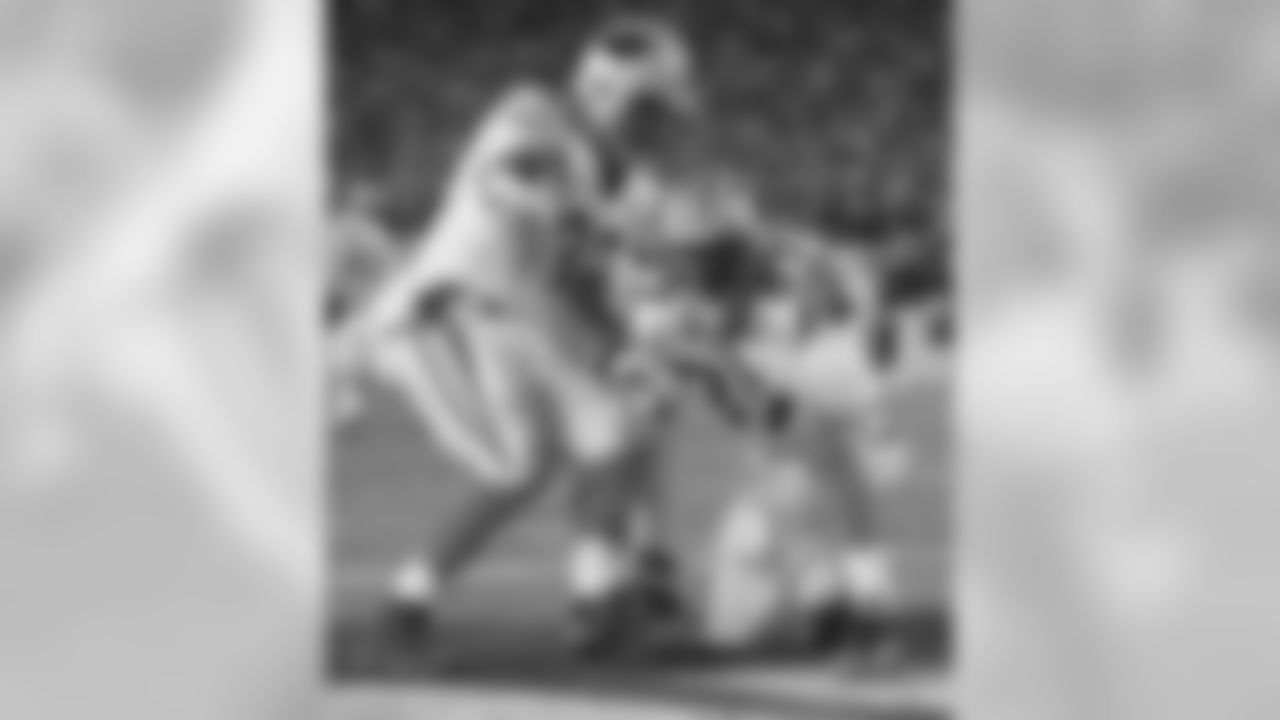
Carolina Panthers' Kris Magnum, left, congratulates Muhsin Muhammad (87) after he scored a second quarter touchdown against the Philadelphia Eagles during the NFC championship game Sunday, Jan. 18, 2004, in Philadelphia. (AP Photo/Miles Kennedy)
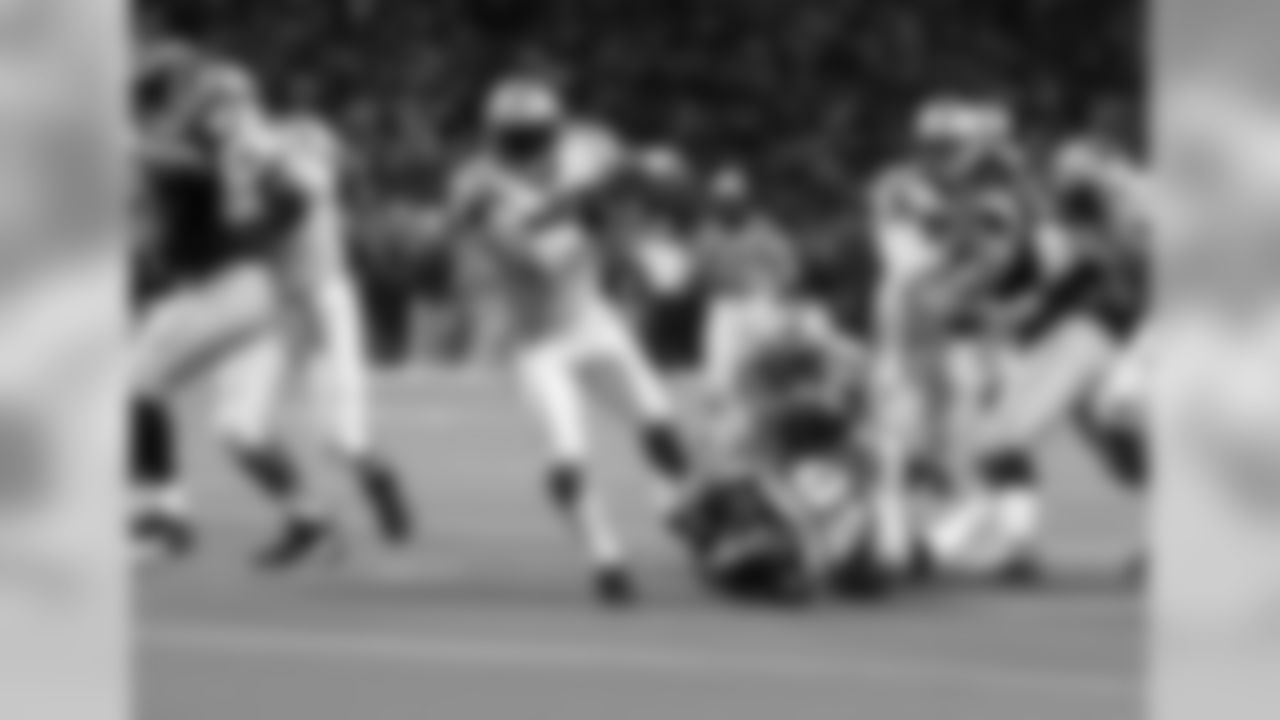
Carolina Panthers running back Nick Goings (37) heads upfield during an NFC Divisional Playoff Game against the St. Louis Rams. The Panthers defeated the Rams 29-23 in overtime on January 10, 2004 in St. Louis, Missouri. (AP Photo/Kevin Terrell)
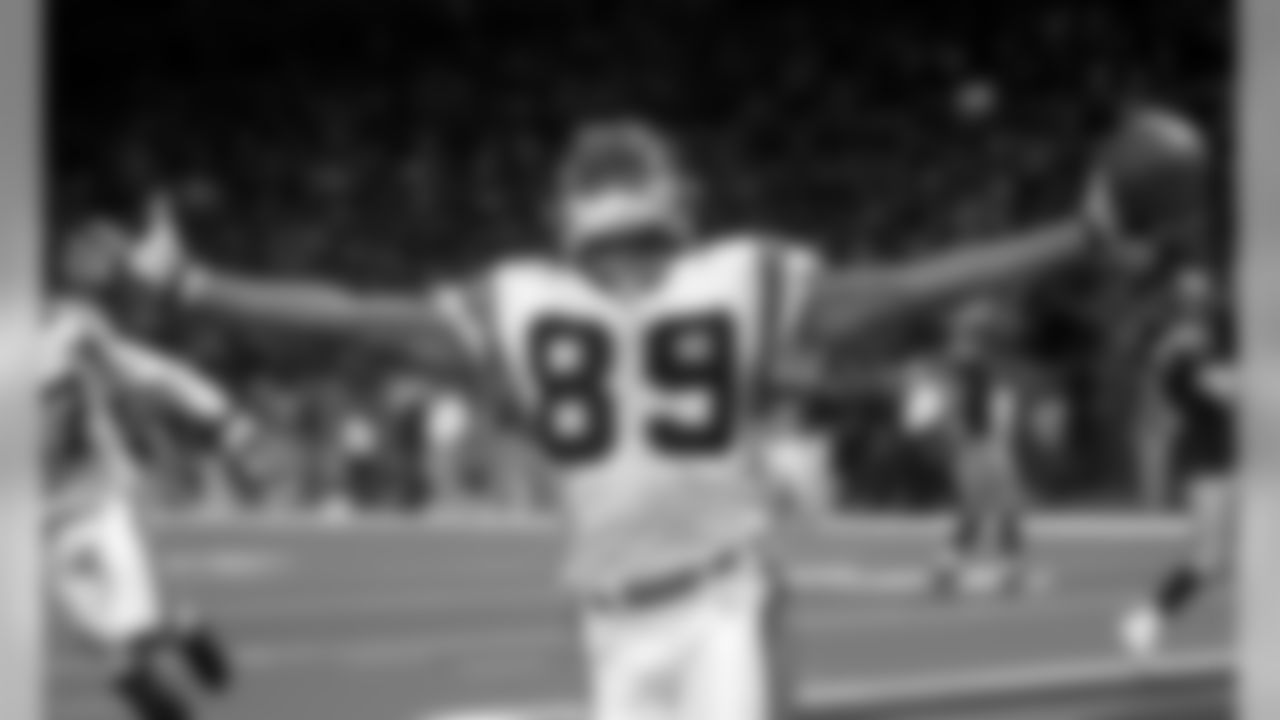
Carolina Panthers wide receiver Steve Smith looks skyward after catching the winning touchdown pass on the first play of the second overtime period against the St Louis Rams in and NFC playoff game in St. Louis Saturday, Jan. 10, 2004. The Panthers beat the Rams, 29-23. (AP Photo/Charles Rex Arbogast)

Carolina Panthers running back Stephen Davis carries the ball against the St. Louis Rams during the NFC divisional playoff game Saturday, Jan. 10, 2004, in St. Louis. (AP Photo/Bill Boyce)

Carolina Panthers quarterback Jake Delhomme (17) celebrates as Jacksonville Jaguars' Danny Clark (54) looks on after Delhomme threw a 12-yard touchdown pass with 16 seconds left in the Panthers' 24-23 win in Charlotte, N.C., Sunday Sept. 7, 2003. (AP Photo/Rusty Burroughs)

Carolina Panthers' Mike Rucker (93) is tackled by Philadelphia Eagles' Jon Ritchie (48) after an interception in the first quarter of the Eagles' 25-16 win in Charlotte, N.C., Sunday Nov. 30, 2003. McNabb overcame his first interception in six games to lead the Philadelphia Eagles to their seventh consecutive victory.(AP Photo/Chuck Burton)
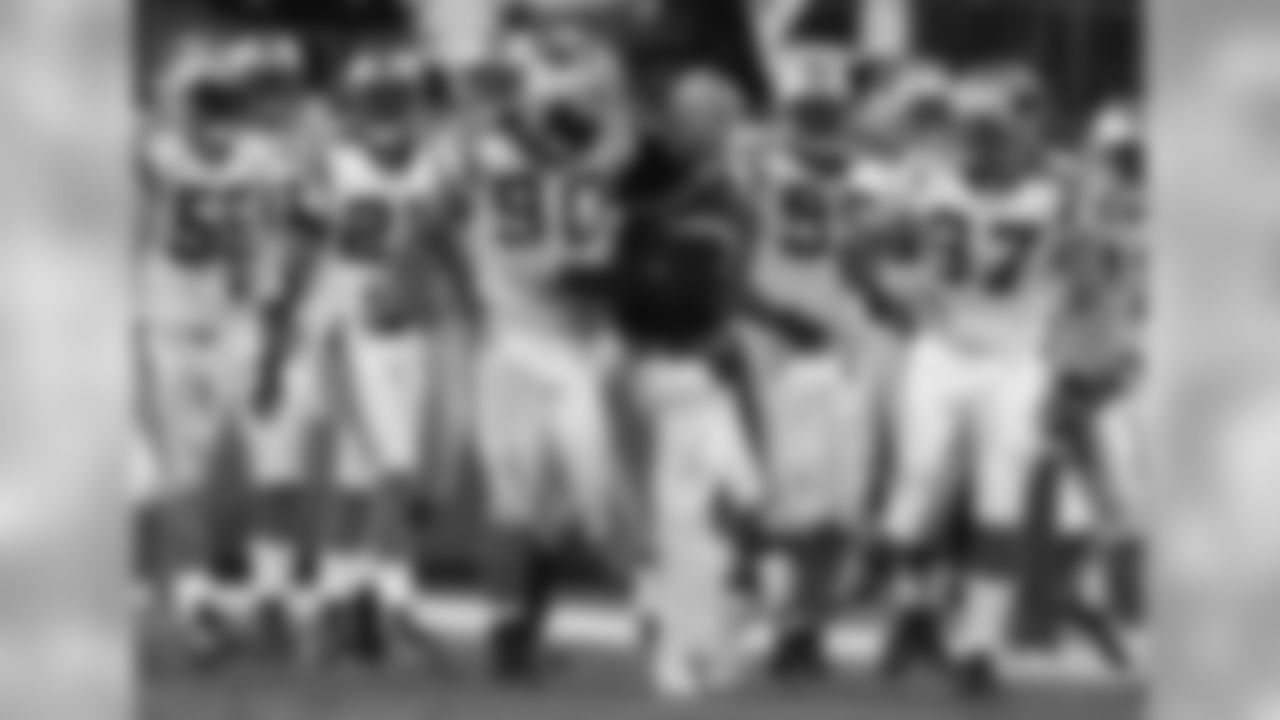
Carolina Panthers head coach John Fox, center, congratulates defensive end Julius Peppers (90) after Peppers' interception in the fourth quarter of the Panthers' 29-10 win over the Dallas Cowboys at Ericsson Stadium in Charlotte, N.C., Saturday Jan. 3, 2004. (AP Photo/Mark Humphrey)

Carolina Panthers running back Stephen Davis carries the ball during the NFC Wild Card game against the Dallas Cowboys in this Jan. 3, 2004 file photo, in Charlotte, N.C. (AP Photo/Tony Gutierrez)

Carolina Panthers head coach John Fox, center, is dunked by his players after the Panthers defeated the Dallas Cowboys, 29-10, at Ericsson Stadium in Charlotte, N.C., Saturday, Jan. 3, 2004. (AP Photo/Tony Gutierrez)

Carolina Panthers linebackers coach Sam Mills leaves the field after the Panthers' game against the Washington Redskins in Charlotte, N.C., Nov. 16, 2003. (AP Photo/Rick Havner)

Carolina Panthers wide receiver Steve Smith tries to stay inbounds during the NFC Wild Card game against the Dallas Cowboys in this Jan. 3, 2004, in Charlotte, N.C (AP Photo/Mark Humphrey)

The celebration begins as Carolina Panthers' Todd Sauerbrun (10) John Kasay (4) and Kris Mangum (86) enjoy their 23-20 victory over the New Orleans Saints, Sunday, Oct. 26, 2003, in the Louisiana Superdome in New Orleans. Kasay kicked the game-winning field goal in overtime. Leave the field for the Saints is Jay Bellamy (20). Holding for Kasay was punter Todd Souerbrun (10). (AP Photo/Andrew Cohoon)

Carolina Panthers' Rod Smart (32) runs past cheering teammates for a 100-yard kick return for a touchdown during the second quarter against the New Orleans Saints in Charlotte, N.C., Sunday Oct. 5, 2003. (AP Photo/Rick Havner)

Carolina Panthers kicker John Kasay points to fans as he leaves the field after kicking a 43-yard field goal in overtime to defeat the Indianapolis Colts 23-20 in Indianapolis, Sunday, Oct. 12, 2003. (AP Photo/Tom Strattman)
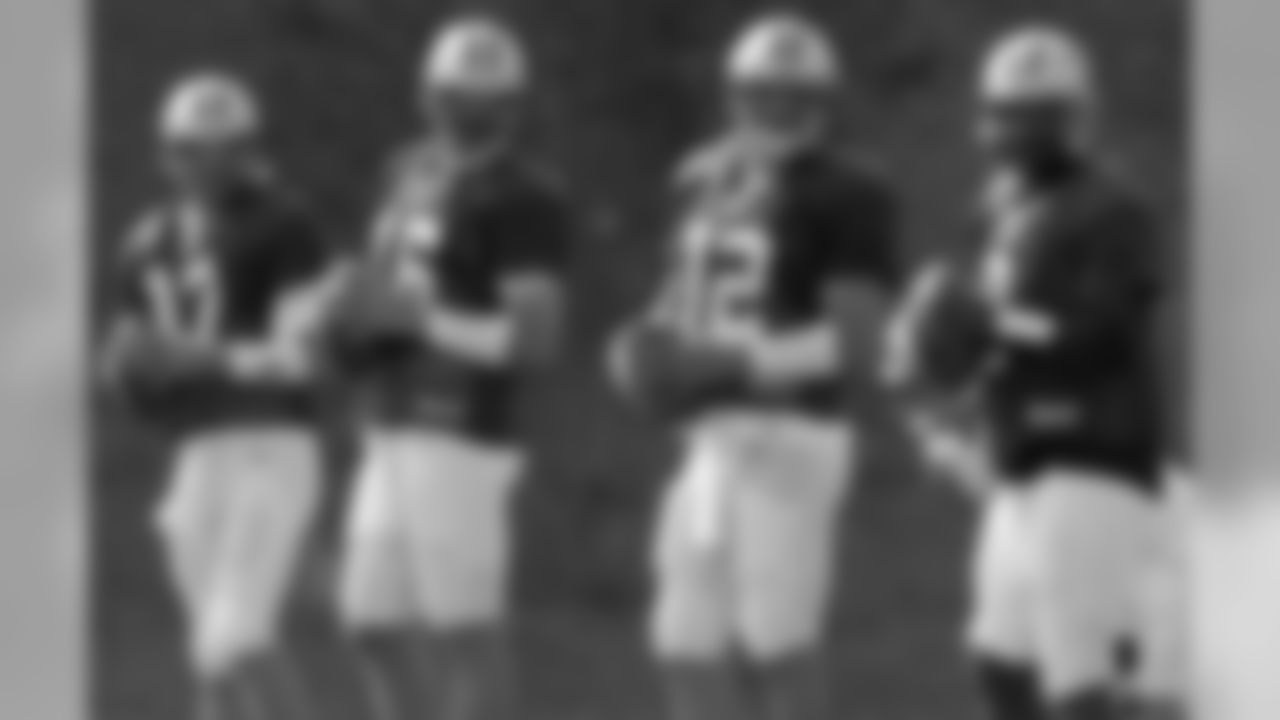
Carolina Panthers quarterbacks Jake Delhomme (17); Chris Weinke (16); Randy Fasani (12); and Rodney Peete (9), prepare to drop back during a drill at the team's training camp in Spartanburg, S.C., Monday, July 28, 2003. (AP Photo/Chuck Burton)

Carolina Panthers' Ricky Proehl (81) catches a 12-yard touchdown pass as Jacksonville Jaguars' Jason Craft (29) defends with 16 seconds left in the fourth quarter in the Panthers' 24-23 win in Charlotte, N.C., Sunday, Sept. 7, 2003. (AP Photo/Mike McCarn)







